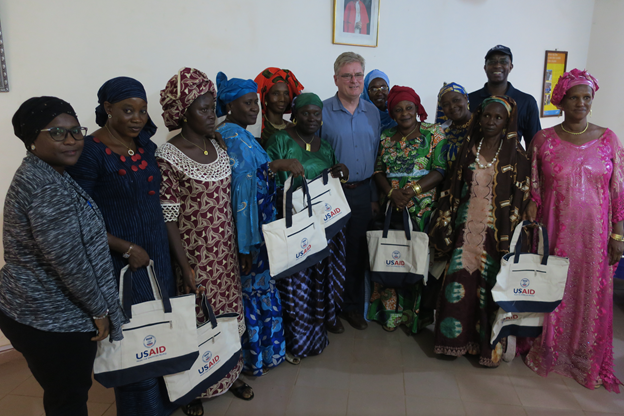Speeches Shim

July 2019- The main barriers to Guinean women’s political and social empowerment lie in several hard-to-change sources, including historical patriarchal social structures and culture that assign public roles to men and household roles to women.
Two days after the vote in the local elections in Guinea in 2018, tensions rose between political parties in Kalinko, prefecture of Dinguiraye and degenerated into violence. During the clashes, houses and properties were burned. These recurrent conflicts between political party activists made communities who have always lived together in peace and fraternity fear a shift to inter-ethnic conflict in Dinguiraye.
In 2016, USAID’s Cultural Cohesion for Peace and Prosperity (C2P2) project began educating women and youth in Dinguiraye and other part of Guinea on the importance of women’s participation in conflict resolution and dialogue in the community. They learned public speaking and conflict prevention and mediation techniques. The aim of the training sessions was to help remove the barriers preventing women to emancipate themselves from the community system (public roles to men and household roles to women).
“Before, women were not bold enough to confront authorities, but now, we have access to the Prefet, Imam, Bishop and Mayor’s offices at any time. They are willing to listen to us” says Naissa Diané responsible for sensitization with Union of Women Leaders of Dinguiraye.
When the post- election conflict occurred in 2018, women leaders in Dinguiraye were already ready to face the challenge. They applied the skills they learnt from the training sessions with C2P2 to solve the situation. They invited the Prefet, the Mayor and belligerent parties to peace talks at the Youth Center. After extensive debate, they succeeded in convincing the activists to end the conflict and support peace in the communities. Another landmark success for women leaders came when they succeeded in solving the conflict between the 2 candidates for the leadership of the Dinguiraye branch of Guinea national trade union organization. After discussions with both candidates and local authorities in a roundtable meeting, the rightful winner took office.
“Before, women were not bold enough to confront authorities, but now, we have access to the Prefect, Imam, Bishop and Mayor’s offices at any time. They are willing to listen to us” says Naissa Diané responsible for sensitization with Union of Women Leaders of Dinguiraye.
In order to maintain social cohesion among the different communities and religions, women of Muslim confession have established monthly cleaning schedule of the church in Dinguiraye just like they do for the mosques.
“We are trying to convince local authorities to build a better church in Dinguiraye because we already have a nice mosque” Naissa continued.
C2P2 started with seven women who developed their public speaking skills during social activities and in 2 years they have attracted more than a hundred members.
Presently, women leaders are working to solve the conflict among Muslim communities as to who should be the calif (Grand Imam) of Dinguiraye.
The Prefet, a delegation of women leaders, the permanent secretary of the commune of Dinguiraye, the mayor and some elders discussed the problem and subsequently helped to restore dialogue between the candidates. This is the beginning of reconciliation. This dialogue is currently underway to solve the problem.
Women leaders use both the traditional and modern conflict resolution mechanisms that have shown their full impact on individuals and communities. Based on the traditional mechanism, they rely on the social capital of the community using respect for pleasant cousinship and inter-ethnic and inter-community marriages existing between the people.
While these women and other women in other parts of the country are making strides to improve their rights in conflict resolution and decision making, there is still much work to be done to ensure that they have a primary role in their communities and the wider society.
The Cultural Cohesion for Peace and Prosperity project which ends in 2021 aims at developing a culture of peace to achieve greater prosperity, peace and development in communities in Conakry and Upper Guinea.

Comment
Make a general inquiry or suggest an improvement.